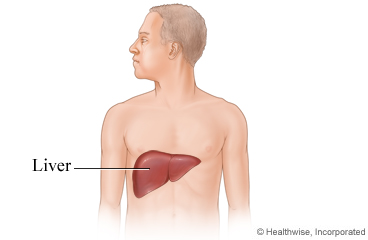Hepatitis: Care Instructions

Overview
Hepatitis is inflammation of the liver. It's caused most often by a virus. It can also be caused by heavy drinking over a long time. Certain medicines can cause hepatitis. And some medicines can make it worse. When this condition is severe, the liver can't remove waste from the body or do its other jobs.
- The hepatitis A virus is spread by food or water that has the virus. This type of hepatitis does not lead to long-term liver problems.
- Hepatitis B is spread through infected blood, semen, or other body fluids during sex. It can be passed from mother to baby during childbirth. It's also spread by sharing needles to inject drugs. Most people who have it get better after 4 to 8 weeks. After you have had this virus, you will not get it again. If it stays in your body for a long time, it can cause serious liver damage.
- The hepatitis C virus is spread by sharing needles to use drugs or sometimes through infected blood, semen, or other body fluids during sex. Most people who have hepatitis C have a long-term infection. Sometimes, it causes serious liver damage.
- Hepatitis from alcohol use can lead to severe liver problems. If drinking is stopped before the liver is severely damaged, your liver may get better.
- Some medicines can cause hepatitis, including over-the-counter and natural health products. The hepatitis usually goes away when you stop taking the medicine, unless serious liver damage has already happened.
- Hepatitis also can be caused by the immune system attacking the liver. This is called autoimmune hepatitis.
You can help your liver heal—or lower the chance of liver damage—by following your doctor's advice.
Follow-up care is a key part of your treatment and safety. Be sure to make and go to all appointments, and call your doctor or nurse advice line (811 in most provinces and territories) if you are having problems. It's also a good idea to know your test results and keep a list of the medicines you take.
How can you care for yourself at home?
- If your doctor prescribes antiviral medicine, take it exactly as directed. Do not stop or change a medicine without talking to your doctor first.
- Lower your activity to match your energy.
- Avoid alcohol for as long as your doctor says. Alcohol can make liver problems worse. Tell your doctor if you need help to quit. Counselling, support groups, and sometimes medicines can help you stay sober.
- Make sure your doctor knows all the medicines you take. Do not take any new medicines unless your doctor says it is okay.
- Follow your doctor's instructions about your diet.
- If you have itchy skin, keep cool, stay out of the sun. Try to wear cotton clothing. Talk to your doctor about medicines that can be used for itching. Follow the instructions on the label.
To prevent spreading hepatitis B or C
- Tell the people you live with or have sex with about your illness as soon as possible.
- Do not donate blood or blood products, organs, semen, or eggs (ova).
- Stop all sexual activity or use latex condoms until your doctor tells you that you can no longer give the virus to others. Avoid anal contact with a sex partner while you are infected.
- Do not share your personal items. These include razors, toothbrushes, towels, and nail files.
- Tell your doctor, dentist, and anyone else who may come in contact with your blood about your illness.
- If you are pregnant, tell the doctor who will deliver your baby about your illness. If you have hepatitis B, be sure your baby gets medicine to prevent infection, starting right after birth.
- Clean or carefully get rid of your clothing, sanitary pads, or anything that has your blood on it.
- Make sure to clean surfaces that have your blood or any other body fluid on them. Examples are semen and menstrual blood. Use a solution of bleach and water. To dilute household bleach, follow the directions on the label. Clean toilet seats, countertops, and floors.
To prevent hepatitis A
- Always wash your hands after using the toilet and before handling food.
- If you have been exposed to someone who may have hepatitis A, ask your doctor about getting a shot of immune globulin (also called gamma globulin). It can help your body fight hepatitis A.
When should you call for help?
Call 911 anytime you think you may need emergency care. For example, call if:
- You passed out (lost consciousness).
- You vomited blood.
Call your doctor now or nurse advice line now or seek immediate medical care if:
- You have new or worse belly pain.
- You have a new or higher fever.
- You are dizzy or light-headed, or you feel like you may faint.
- You have symptoms of dehydration, such as:
- Dry eyes and a dry mouth.
- Passing only a little urine.
- Feeling thirstier than normal.
- You cannot keep down medicine or fluids.
- You have new or more blood in stools.
- You have new or worse vomiting or diarrhea.
Watch closely for changes in your health, and be sure to contact your doctor or nurse advice line if:
- You do not get better as expected.
Where can you learn more?
Go to https://www.healthwise.net/patientEd
Enter B919 in the search box to learn more about "Hepatitis: Care Instructions".
Current as of: October 19, 2024
